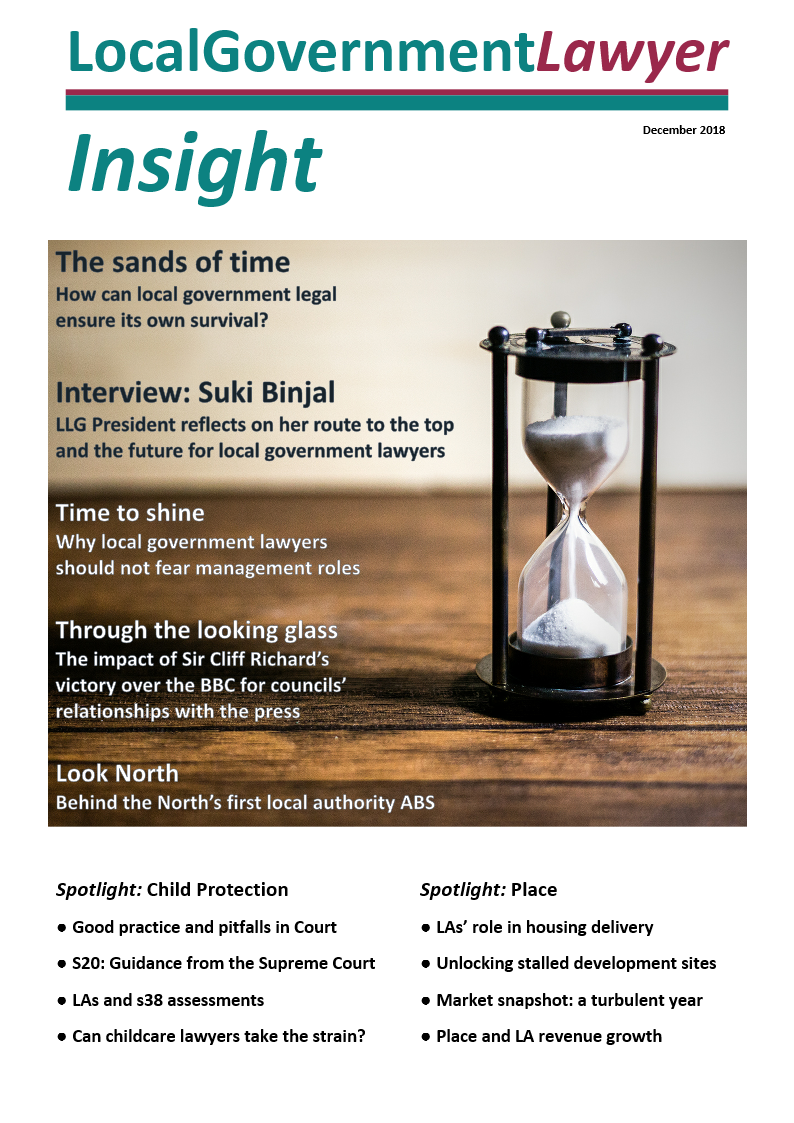A market snapshot
Nathan Holden and Clive Pearce look at the lessons to be learned from recent topical legal cases and other changes in the real estate market of relevance to local authorities.
- Details
 Property development is a major challenge for local authorities. Not only do they have to cope with a changing legal landscape but also the vagaries of the commercial climate.
Property development is a major challenge for local authorities. Not only do they have to cope with a changing legal landscape but also the vagaries of the commercial climate.
EU procurement
When is a development agreement likely to constitute a works contract for the purposes of the EU procurement rules?
This question has been rumbling on since the ECJ’s decision in Auroux1, which widened the scope for development agreements to be caught by the Public Contracts Regulations 2015.
This case was followed by Helmut Müller2 which held that: (a) exercising regulatory planning functions did not qualify as procurement; and (b) for a public works contract to exist an essential element is that the contractor must assume a legally enforceable obligation to carry out the works.
In respect of (b) a creative approach had been adopted whereby development obligations would only be triggered in the event options were exercised, that is, some time after the contract had been entered into. In this way, at the moment the contract was entered into, there were no binding development obligations.
The Court of Appeal in Faraday3 has held that such arrangements do not comply with the Public Contracts Regulations because they involve a contracting authority agreeing to act unlawfully in the future, that is, by effectively agreeing to contract for works in the future.
A second feature of the judgment is that it is the first time that a contracting authority has had a finding of ineffectiveness made against it in the English Courts. A fine of £1 was imposed, although had the circumstances been different then it is likely to have been a lot higher. Finally the Court had some interesting observations about the adequacy of the drafting of voluntary transparency notices.
Disposing of open space land
Local authorities have very broad powers to dispose of land under section 123 Local Government Act (LGA) 1972. However, where ‘open space’ is involved there is a further obligation to advertise the proposed disposal and consider any objections received. The conventional wisdom has been that by following this process it is possible to defeat the open space status of the land.
However, the recent decision in Wandsworth4 is a reminder that this will not always be the case. The Court held that the disposal of land by way of a lease to a private nursery would be contrary to a statutory trust arising under section 10, Open Spaces Act 1906, because no public access to the land would, thereafter, be permitted.
In order to avoid a similar situation arising in future a simple solution is to appropriate the land from its open space use to planning purposes in reliance on section 241 Town and
Country Planning Act 1990. Appropriation is the process by which local authorities transfer how they hold land from one statutory function to another. Section 122 LGA 1972 governs the process.
This requires that the local authority resolves that the land is no longer needed for the purpose for which it is currently used and the new function, or use, to which it is to be put is one for which they could have acquired the land. As with section 123 LGA 1972 there is an obligation to advertise where ‘open space’ is involved.
Town and Village Greens (TVG)
The registration of land as a TVG strikes a fatal blow to any hopes for its development. This can be as much of a problem for the public sector as it is for the private sector. In addition to proving that the land has been used for recreational purposes for a continuous period of 20 years, the registration authority must also be satisfied that the recreational pastimes have been exercised, without force, openly and without permission.
Recently, insofar as local authorities are concerned, the focus has been on the permission question and whether land held and provided for public recreational purposes stops in its tracks any claim that the land has been used without permission (see Barkas).
The topical area of interest now, for public bodies, is whether the statutory basis on which land is held is incompatible with the creation of TVG rights. This principle was established in Newhaven in which it was held that land could not be registered as a TVG because its statutory use as a port was incompatible with its designation as a TVG.
In conjoined appeals in Lancashire County Council and NHS Property Services the Court of Appeal clarified the application of this principle, in the former case holding that the carrying out of a local authority’s functions as an education authority were general, i.e. they were insufficiently specific, so as to give rise to the necessary degree of statutory incompatibility.
However, the issue is not closed because the Supreme Court has now granted leave to appeal against the Court of Appeal’s decision.
State of the market
The real estate development market, already in flux due to the ongoing collapse of the retail market and Brexit undercurrents, is set for uncertain times going forward as a result of government plans to implement substantial structural changes to the residential leasehold market including:
- Imposing a ban on leasehold tenures for houses save where absolutely necessary (for example shared ownership);
- Banning ground rents on all new leasehold flats; and
- Introducing new ways for developers to create long-term arrangements for the maintenance of shared facilities and open spaces on new developments (so possibly an end to rent charges!)
Whilst the government has been consulting on these plans since 2017, and the market has started to incorporate the expected ban on ground rents into new residential development schemes, it is still not clear how the government intends to implement alternative satisfactory arrangements that will allow for the transmission of positive covenants that are generally required for large developments (and which was not necessarily an issue on leasehold transmissions). This is especially the case where there are substantive communal elements such as combined heat and power arrangements.
Traditionally the inability of positive covenants to pass with land has required developers of large schemes to rely on leasehold structures or, less often, rent charge deeds. We should also mention, of course, the alternative commonhold arrangements that have been available for some time but given the market has steadfastly refused to embrace this structure it seems clear that this will not be an acceptable alternative to the existing ‘tried and tested‘ structures now under threat. Additionally, obligations to provide deeds of covenant on transfer protected by restrictions have proven unwieldy in the context of large schemes.
In addition, on 2 July 2018 the Ministry of Housing, Communities and Local Government confirmed that:
- new government funding schemes will no longer be able to use funds for unjustified new leasehold houses; and
- it will be introducing new proposals to create a minimum Assured Shorthold Tenancy (AST) lease term of 3 years with a six-month break clause to give renters greater term assurance and landlords longer term financial security.
Developers now face the prospect of reduced scheme viability because of the inability to capitalise ground rents and a potential softening of the Private Rented Sector market (recently seen as a key part of schemes in urban areas) due to the proposed AST changes.
All of this will make for interesting negotiations between local authorities and private developers for new regeneration schemes. 2019 is shaping up to be a momentous year for the real estate development markets.
Watch this space….
Footnotes
1 Case C-220/05 - Jean Auroux and Others v Commune de Roanne
2 Case-451/08 - Helmut Müller GmbH v Bundesanstalt für Immobilienaufgaben
3 Faraday Development Ltd v West Berkshire Council and another [2018] EWCA 2532 (Civ) (14 Novemeber 2018)
4 (R Alexander Keay Muir) v Wandsworth BC [2018] EWCA Civ 1035
Nathan Holden is a partner and Head of Local Government and Clive Pearce is a real estate partner at Freeths.
http://www.freeths.co.uk/people/nathan-holden/
http://www.freeths.co.uk/people/clive-pearce/

This article was first published in the December 2018 edition of Local Government Lawyer Insight, which can be accessed at http://www.localgovernmentlawyer.co.uk/insight Insight is published four times a year and is circulated free-of-charge to all Local Government Lawyer newsletter subscribers (click here to subscribe) in electronic format. A single hard copy is also circulated to all local authority legal departments in England and Wales. Also in this issue: Sands of time Interview: Suki Binjal Time to shine Through the looking glass Look North Spotlight: Child Protection
Spotlight: Place
|
Contracts & Procurement Lawyer
Lawyer - Property
Senior Lawyer - Contracts & Commercial
Trust Solicitor (Employment & Contract Law)
Locums
Poll







































